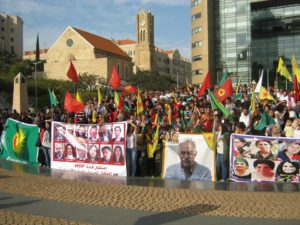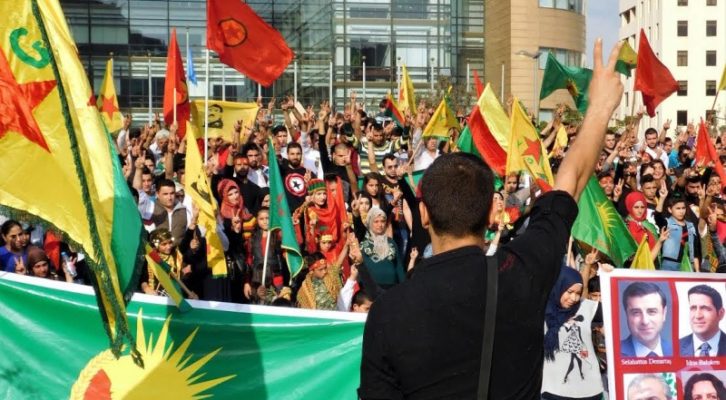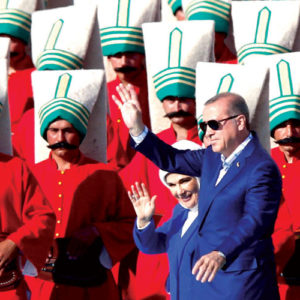Many members of the Kurdish community in Lebanon cannot give a solid answer to the question of whether they consider themselves Kurdish first and foremost, or Lebanese. It’s a conundrum shared by many other national and ethnic groups in the country, who arrived in the 20th century as refugees and immigrants, but were only ever partially integrated into the political and social fabric of Lebanon. Here, some Kurdish families have been prominent member of Beirut society since Ottoman times, while others are newly arrived refugees from Syria, with little hope of ever gaining official permission to stay in the county, let alone citizenship. Under these circumstances, Lebanese Kurds are caught between integration in the local Sunni community, and allegiance to independence movements back in Kurdistan. The community is fractured between being “Lebanese” and being “Kurdish”. As with many diaspora communities, those who cling to Kurdish identity are just as split; between support for the Barzani government in Iraqi Kurdistan and the democratic confederalist ideology of the PKK and PYD.
In the 1980’s the Kurdish population of Lebanon numbered between 60,000 and 90,000, and was centred in Beirut and its suburbs. Most had left rural Turkey in the earlier half of the century, fleeing persecution at the hands of Turkish nationalists. Sixty years later, the small community was only partially accepted in Lebanon; a country where political power is tied to strong ethno-religious sects. Thus, the Kurds were largely ignored, or treated as second rate members of the Sunni community. It was under these circumstances that the Kurdistan Worker’s Party (PKK) under the leadership of Abdullah Ocalan moved into the Beqaa valley in eastern Lebanon.
In the 1980’s the PKK was forced to leave Turkey to expand their military capabilities. They resettled in civil war torn Lebanon, with the blessing of the Palestinian Liberation Organization (PLO). The two organizations represented the populations that had been cheated out of self-determination by the Sykes-Picot agreement, and both combined their nationalist rage with left wing idealism. They became close allies, especially as Lebanese Kurds, affected by the civil war, often joined Palestinian factions rather than form their own militia. The PKK, which was otherwise not involved in the ongoing fighting, mobilized its guerrillas to aid the PLO when Israel invaded Lebanon in 1982. However, the Israelis proved successful in their invasion, and forced the PLO to flee to Tunisia. The PKK, however, remained.
Simon Resho, like many other Lebanese Kurds, joined the PKK during those years. He says he felt inspired by Ocalan’s presence, and hopeful about the opportunities he provided for the marginalized community in Lebanon.
“You don’t feel like he is a leader, he is a brother.” Resho noted, from his home outside Beirut, “Everyone who loves life, who loves freedom was with him.”
When Ocalan was eventually compelled to leave Lebanon for the Qandil mountains in the 1990’s, Resho followed the party, and spent years working for the PKK media office. Few others from Beirut made the move, and the political awakening that had gripped the Kurdish community while the PKK was in the country ebbed away. Instead, many threw their political support behind the Future Movement, the powerful Lebanese Sunni political party run by the powerful Hariri family. Prime Minister Rafiq Hariri, who came to power after the end of the Lebanese civil war, remains one of the most popular politicians in the country’s history. He was also largely responsible for granting citizenship to Lebanese Kurds, who had previously been stateless, significantly bolstering his popularity in the community. Yet Resho sighs when he talks about his fellows who became Future movement supporters, “These,” he said, “are the ones who don’t know themselves as Kurds.”
While Lebanese support for the PKK waned in the 1990’s and 2000’s, those looking for a champion of Kurdish identity increasingly turned to the rising power of the Barzani regime in Iraq. In 1991, the American led Operation Provide Comfort opened the door for Iraqi Kurds to establish an autonomous government in the northern most parts of the country. Virtually the only academic study on Lebanese Kurds, conducted by American University of Beirut professor Lokman Meho, contains extensive references to Iraqi Kurdish leader Masoud Barzani, while minimizing the influence of other political entities in greater Kurdistan. While Meho himself recognizes that Barzani didn’t – indeed couldn’t – offer much support to diaspora Kurds, the successes of Barzani’s Kurdistan Democratic Party (KDP) became a source of inspiration. While there had been a small pro-Barzani political party – KDP in Lebanon – for decades, the 1990’s saw open and widespread organizing in favour of the Barzani’s.
Yet in recent years many of those organizations have shut their doors, or become unable to provide support in the community, as support has swung back towards Apoist parties. Today, the most active Kurdish cultural centre, Rabatat Nowruz, shows strong support for the PKK and their ideological counterpart in Syria, the Democratic Union Party (PYD). Hanan Osman, the Director of Rabatat Nowruz, says that the organization has no formal links to these parties, but uses their model for both strengthening Kurdish cultural identity, and spreading democratic confederalist and feminist ideology in Beirut. While the centre’s Kurmanji language and traditional dance classes cater mostly to Beirut’s Kurdish community, the women’s empowerment programs draw in a wide audience, including Armenians, Assyrians, and Arabs of various political sects. Osman sees the inclusion of different ethnic and religious groups as key to promoting the ideas of her hero, Ocalan.
“We, the women, see freedom in this philosophy. It is so different than Barzani.”
Both Osman and Resho believe that the situation of Kurds throughout the region has changed since PYD forces drove the ISIS out of Kobane in 2015. The fighters of the People’s Protection Units (YPG) and Women’s Protection Units (YPJ) gained international fame for breaking the siege of the city. Since then, they’ve experienced a new respect for Kurds in Lebanon. The Kobane uprising changed things in other ways for the Lebanese Kurds as well. Sources inside the YPG say that several hundred fighters left Lebanon to fight in northern Syria during the time of the siege. Almost no Lebanese Kurds have left to fight since then, underscoring the symbolic weight that the battle for Kobane carried.
The success of the YPG and YPJ militias has also had an effect on Syrian Kurds who fled to Lebanon during Syria’s civil war. While not even the UNHCR keeps exact records of how many Kurds arrived in Lebanon after the war began, Osman says that hundreds or thousands of refugees have been able to repatriate to Northern Syria, where the militias have maintained greater stability than most other parts of Syria. The idea of returning to a distinct homeland holds great appeal for Lebanon’s Kurds.
Kurdish Influence in Lebanon
While organizations like Rabatat Nowruz, and their Apoist supporters are not actively supporting or recruiting for Kurdish political parties, they are building relationships with potentially sympathetic groups that are active in Lebanon. Most noticeably, Kurdish groups, as well as members of Lebanon’s domination Armenian party, Tashnag, and the Lebanese Communist Party (LCP) held a series of protests last November upon the arrest of HDP politicians in Turkey. The HDP, or Peoples’ Democratic Party, is a left-wing alliance that has historically supported Kurdish, and other minority rights.

A protest in solidarity with the Kurds in Turkey, Beirut, November 20, 2016
The alliance between Kurdish groups and Tashnag is largely based on opposition to their common Turkish enemy. The relationship with the Communist Party is more nuanced. The LCP originally welcomed the PKK to Lebanon in the 1980’s, and delighted in seeing Kurds training alongside their fellow communists in the Popular Front for the Liberation of Palestine (PFLP), one of the main factions of the PLO. However, since the PKK dropped marxism/leninism in favour of the distinctly more anarchist democratic confederalism, communist parties in the region have grown more wary. Yana Samarane, who heads women’s rights initiatives within the LCP says that Rabatat Nowruz is one of her best partners for feminist action. The LCP, whose small militias are stationed on the border with Syria, also sees the Kurds as strong allies in the fight against ISIS. Many members still see socialism in the Middle East as intrinsically linked to Pan-Arab Nationalism, and aren’t ready to consider a high level of political decentralization.
For Samarane, the decision on how to prioritize localism is a continual conundrum, “Should we change in our country? Should we fight for Pan-Arab causes?” She paused to consider “But till now Lebanon is not a real country? Would this idea [confederalism] unite or divide us?”
The dissonance in the Lebanese left over whether to support broadly nationalist causes, or to work on decentralization and empowerment at local levels is mirrored amongst Lebanese Kurds, who have spent decades caught between Ocalan’s interpretations of socialism, Barzani’s conservative nationalism, and assimilation into the Lebanese Sunni working class. This has largely depended on where the strongest leadership emerges at any given point in time. However, in the new era of PKK/PYD influence, Lebanese Kurds say they’re more motivated than ever to assert their rights and identity without the influence of any single leader. Rather, they claim to be led by a common ideology and identity.
Or, as Simon Resho puts it “Our beliefs are what make us strong, our respect for women and for youth make us strong, and remembering that we are Kurds and not Arabs makes us strong.”
The original source: Kurdishquestion.com
Clare Maxwell is a journalist and media activist living in Beirut, Lebanon. Her work has appeared in Mondoweiss, Electronic Intifada, al-Araby al-Jadeed, and Al-Monitor.







